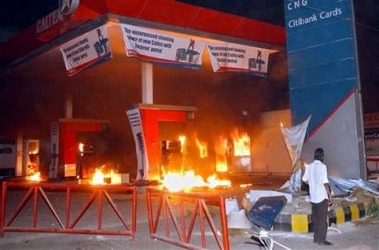A suicide attacker detonated a bomb during an outdoor Sunni Muslim prayer
service Tuesday, killing at least 41 people and wounding dozens. In the mayhem
that followed, angry mobs torched cars and hurled rocks at police, who fired
warning shots in the air.

A Pakistani boy looks
at a burning petrol station set on fire by angry protestors after a bomb
explosion in Karachi, Pakistan, Tuesday, April 11, 2006. A powerful bomb
exploded during an Islamic prayer service in a park in this southern
Pakistani city on Tuesday, killing at least 40 people, the interior
minister said. Dozens more were wounded. [AP] |
The attacker blew himself up near leaders of the Sunni Tehrik religious
group, which helped organize the prayer service at a downtown Karachi park,
police chief Niaz Siddiqui said.
The religious leaders were sitting near a stage erected in front of the
thousands of Sunni Muslims marking the birth of Islam's Prophet Muhammad.
Several leaders were killed.
"The bomber used about 5 kilograms (11 pounds) of explosives obtained
locally, and we have collected his body parts," Siddiqui told The Associated
Press.
Interior Minister Aftab Khan Sherpao told the AP that at least 40 people were
killed. Officials at three Karachi hospitals later said they received 41 bodies.
President Gen. Pervez Musharraf condemned the attack and ordered increased
security at religious sites, adding that the culprits "will not go unpunished,"
according to a statement issued on Pakistan's state-run news agency.
It was not immediately clear who was responsible for the bombing, one of the
deadliest ever in Pakistan, a key U.S. ally in the war on terrorism. Attacks in
the past have been linked to simmering Shiite-Sunni Muslim tensions, and most
have been blamed on outlawed extremist groups.
Mayhem erupted after the explosion. Scores of men wearing white,
blood-splattered robes clambered onto the stage to assist victims, some
apparently dead and others wounded and waving their arms for help.
"I saw body parts everywhere," Mohammed Asif said. "I saw people collecting
body parts and putting them into ambulances."
Crowds of people ran frantically in different directions, many aiding and
carrying the wounded to dozens of ambulances. Some waved green flags bearing
Quranic scripture. Others wept openly. A thick cloud of white smoke from the
blast hung above the park.
Police officers fired into the air to disperse crowds that massed at the
scene.
Soon after the bombing, violence erupted in nearby areas as groups of youths
burned a gas station, buses and several cars. Another mob pelted security forces
with stones after the blast.
Television footage inside several Karachi hospitals showed scores of victims
being treated in crowded wards. A screaming woman wailed over a person killed in
the blast, the body covered by a white sheet on a hospital bed.
A young boy with burns on his face said he was praying in the park when the
massive blast went off.
"I saw fire and smoke after the big explosion," the unidentified boy told Geo
television.
Two prominent Sunni Muslim clerics were among the dead: Akram Qadri, a senior
leader of the Sunni Tehrik group that organized the service, and Karachi Sheik
Hanif Billu, government and hospital officials said.
"Whoever did this was not a Muslim," said another Tehrik leader, Tanveer
Shafi.
Karachi has been the scene of several bombings and other attacks since
Pakistan became a key U.S. ally after the Sept. 11 attacks.
Tuesday's explosion was Pakistan's deadliest since March 19, 2005, when a
bomb killed 43 people at a Shiite shrine in the southwestern Baluchistan
provincial town of Naseerabad.
On March 2, a suicide bomber who was blocked from driving into the U.S.
Consulate instead slammed into an American diplomat's car, killing the envoy and
three others just days before President Bush visited.